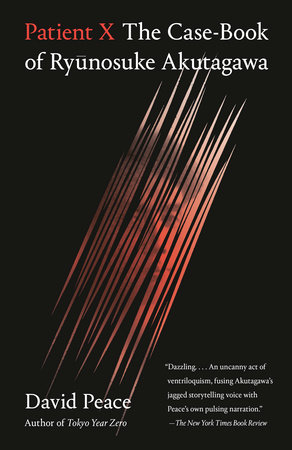Patient X Reader’s Guide
By David Peace


1. Discuss the author’s preface for Patient X. How does this section establish the tone and style for the book? What themes are touched on in this preface that echo throughout the book?
2. Consider the section “After the Thread, Before the Thread.” What is the effect of starting the novel with this passage? How does the tension between Eastern and Western religions emerge throughout Patient X? Discuss Akutagawa’s interest in Christianity and his fixation on Christ as a figure of literature and spirituality.
3. In the section “The House of Books” (page 23), the words “And your own frugality, and your own guile” are used repeatedly. What is the significance of this phrase? What effect does this repetitious language have on the narrative?
4. In the first section of “Hell Screens,” Akutagawa states, “The first act of the human tragedy starts when an individual becomes the child of certain parents.” How does this scene, and its graphic depiction of birth, lay the groundwork for the rest of the narrative? What does this statement assert about Akutagawa’s own sense of his identity? Discuss his childhood and parentage, and how issues of uncertainty shaped his worldview.
5. In Patient X, Peace blends fact and fiction, dreams and reality, reminiscence and projection. How does this constant oscillation destabilize the idea of “truth” in storytelling? Which sections, if any, were difficult for you to determine as fact or fiction?
6. Akutagawa’s interest in Poe undergirds his work and influences his own writerly impulses. Consider Poe’s public stature and his descent into “madness.” Does Akutagawa romanticize the decline, or does he approach it with trepidation?
7. How does Akutagawa’s awareness of his mental health play into the narrative? Consider his experience with his mother’s mental health and how that shapes his understanding of himself from an early age. By the end of the novel, what does Peace’s interpretation of Akutagawa’s decline assert about the treatment of mental health throughout history? In the consideration of art?
8. What does Akutagawa embrace about Japanese identity? What does he reject? Consider his experiences with Western culture. Which aspects does he find compelling? How do his contemporaries view his interest in Western culture?
9. Discuss Akutagawa’s relationships with women. How would you describe his feelings towards marriage? Parenting?
10. How did you interpret the “Jack the Ripper” section of the novel? What does this interaction reveal about colonialism? About Akutagawa’s own impulses as a man bridging the Eastern and Western worlds during this time period?
11. Throughout the narrative, intertextual materials are used to provide historical context for significant moments in Akutagawa’s life. How does this interplay of fact and fiction help to ground the narrative?
12. Discuss the death of the Emperor and the subsequent suicides of General Nogi and his wife. What effect did this have on Akutagawa? How are death and honor linked in Japanese culture? How does the idea of honor play into Akutagawa’s own choice to take his life?
13. In the section “Saint Kappa,” the voice of the novel changes from third person to first person to provide a different lens on Akutagawa’s life. Why do you think Peace chose to employ a roving narrative lens throughout Patient X?
14. What is the significance of concluding Patient X with a straightforward biographical recounting of Akutagawa’s life? Compare this narrative style and tone with that which is utilized throughout the book.
15. The thirteen sections that comprise Patient X utilize a wide variety of stylistic modes, perspectives, and genres. Consider the metafiction angle of this project. What does Peace’s interpretation of Akutagawa’s life assert about the inner lives of writers? What elements of the read struck you as most moving? Most chilling?
Just for joining you’ll get personalized recommendations on your dashboard daily and features only for members.
Find Out More Join Now Sign In